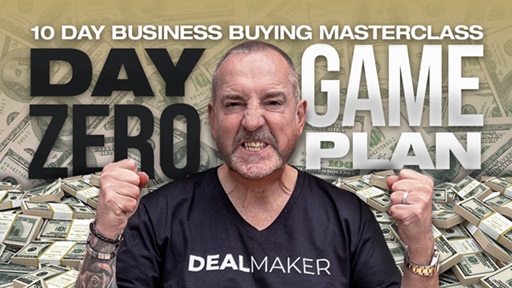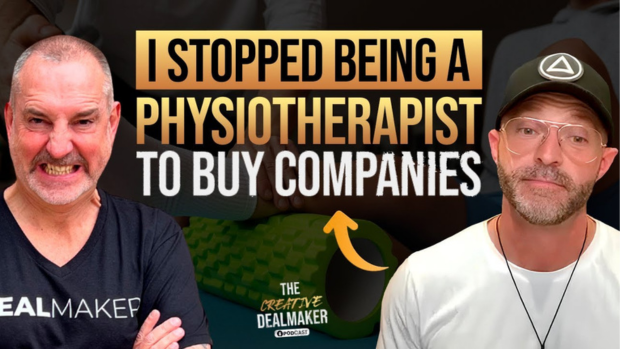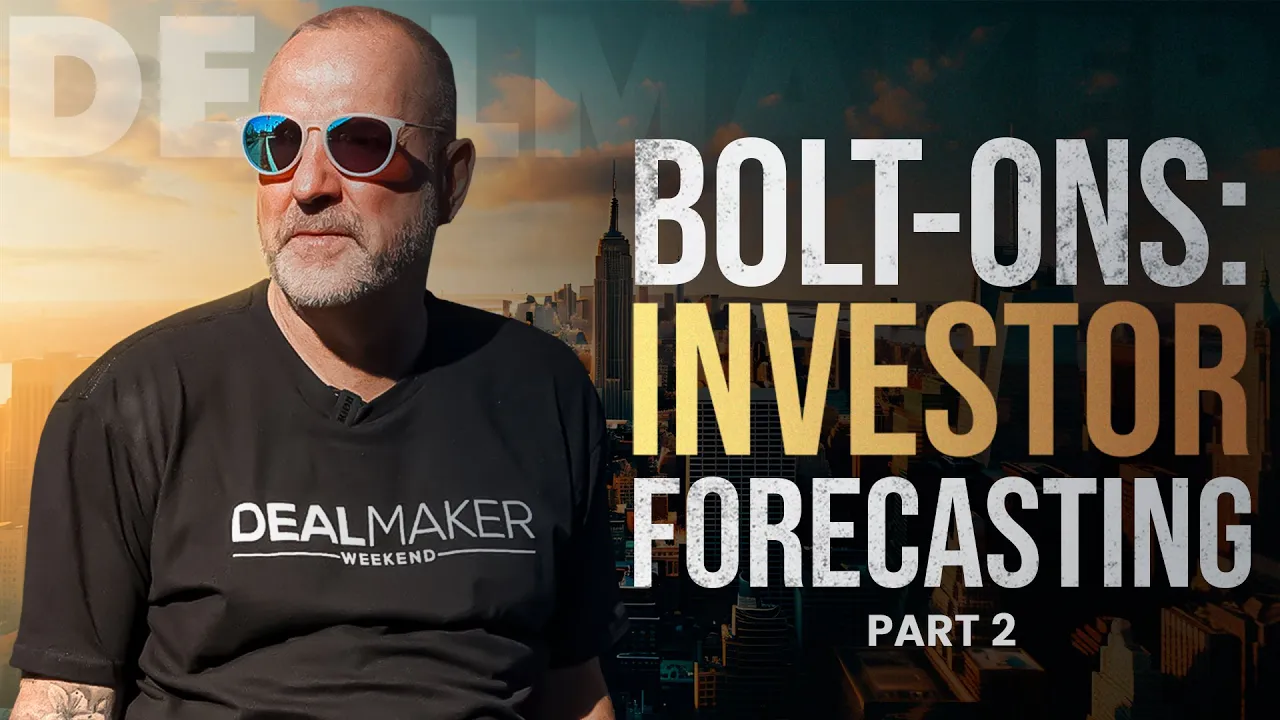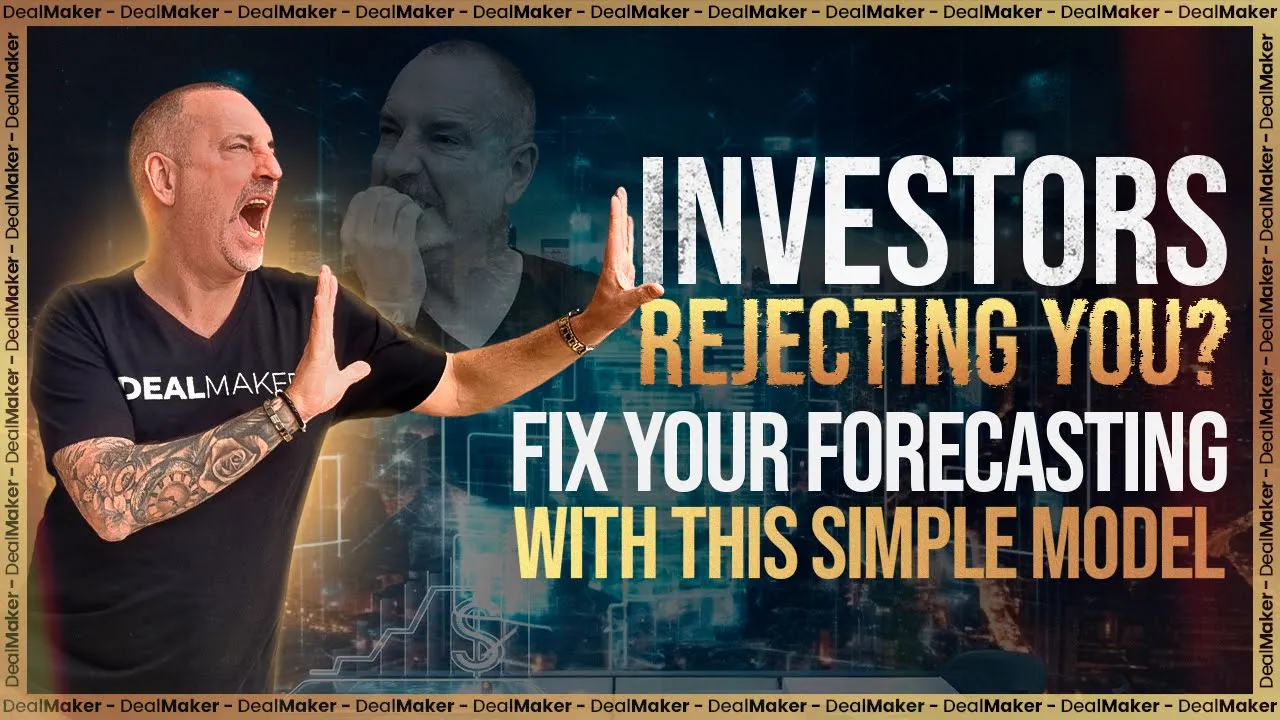Day 8 – Execution | 10 days to Your First Deal
Day 8 – Execution | 10 days to Your First Deal
In Day 8 of Carl Allen’s podcast series, “10 Days to Your First Deal,” Carl discusses the critical phase of deal execution. He begins by emphasizing the importance of the debt service cover ratio, which guides every deal by comparing the cash flow a business generates to the amount of cash needed to service the debt. He revisits his strategy from the previous day on offer sequencing and reminds listeners to use this ratio to structure their deals effectively.
Once an offer is accepted, the next step is to sign a Letter of Intent (LOI). This document outlines the key points of the deal, including the total price, terms, and any seller financing, such as earn-outs or seller notes. Carl also highlights the importance of determining the business’s working capital needs, which typically amounts to two months of revenue. This prevents the seller from draining the company of its resources before closing the deal.
Carl then moves on to discussing the importance of securing funding. He advises listeners to obtain a term sheet or an expression of interest from lenders as proof of funds, which can then be presented to the seller alongside the LOI. This is crucial for showing that the buyer has the capital needed for the closing payment. He also talks about assembling a deal team—a CPA for financial due diligence and an attorney for legal work—both of whom might work on a contingent fee basis if relationships have been established.
The podcast covers the key elements of due diligence. Carl explains that financial due diligence ensures the business’s numbers are accurate, while legal due diligence guarantees the business is legally safe to purchase. The CPA and attorney may collaborate with the lender’s team to share the workload. He stresses the importance of thoroughly vetting the business’s assets, contracts, and potential liabilities.
Finally, Carl touches on commercial due diligence, where the buyer personally assesses the market, customers, and growth potential of the business. He advises building a 12-month cash flow forecast to ensure the business’s viability post-acquisition. Carl concludes by preparing listeners for Day 9, which will focus on the final step—closing the deal and taking ownership.
Full Transcript:
Every single deal that you do, everything in deal making is guided by that debt service cover ratio. It’s the ratio between the amount of cash flow that the business generates from its operations divided by the amount of cash that needs to leave the business in order for you to service the deal.
Hey, guys. Karl Allan. Welcome to day eight of ten days to your first deal. So yesterday, we were talking about offers and negotiation, and I showed you my offer sequencing strategy where you can gently sweeten offers over a series of negotiations without impacting important metric. What was it? Can you remember?
The debt service cover ratio. Really, really important. Every single deal that you do, everything in deal making is guided by that debt service cover ratio. It’s the ratio between the amount of cash flow that the business generates from its operations divided by the amount of cash that needs to leave the business in order for you to service the deal.
So by now, if you’ve implemented yesterday’s training, you will have had an accepted offer. So now, today, we’re gonna talk about deal execution. So there’s a number of things that you’ve gotta do to get the deal ready for closing, which is what we’re gonna talk about tomorrow. So the first thing that you gotta do once you’ve got a verbal acceptance of your offer is you need to sign something called an LOI.
That’s a letter of intent. So a letter of intent it’s like an executive summary of all the deal points. So you’ll talk about the total price you’re paying for the business and what are the terms of that money, how much of it is going down at close, how much of it is in seller notes, how much of it is in earn out? Is the seller retaining any of the ownership?
Going back through all of the different points I worked through yesterday, what you basically agree wherever you are in the offer sequence, you basically put that down on a two to three sheet piece of paper and that’s called an LOI. So that’s the first thing that you do. The second thing that you do is you need to calculate what the working capital is gonna be in the business. And normally, you’re looking for a minimum of two months of, revenue in working capital.
So the business is doing a million dollars a year in revenue. You want two hundred and forty thousand dollars in in working capital. So in the LOI, you will set what that minimum working capital amount is. So what happens then is that stops the seller draining all the cash and all the working capital out the business.
That’s like accounts receivables, inventory, running up the AP, all that stuff, not paying taxes, all those different things. So you set that minimum amount. And remember from yesterday, working capital is fuel in the business that you buy, so you absolutely need to have work capital in the business at closing. So you figure that out.
So once you’ve done that, what you then want to go and do is you want to go and talk to lenders. So with lenders, what we’re gonna be doing is we’re we’re gonna be looking for, at the minimum, an expression of interest or even better, a term sheet. So we’re gonna be offering up the assets to lenders. You’re gonna be showing them the income statements.
You’re gonna be showing them the deal structure. If your deal needs a closing payment and you’re not putting that money in yourself, which you probably shouldn’t be doing, then you’re gonna be talking to lenders, investors, SBA, Angels, all those different things generally that closing payment. So once you’ve spoken to them and they’ve been through and they vetted the deal with you, they will give you, either a term sheet, which is amazing, or worst case, if that’s gonna take a bit more time, get an expression of interest for them. So that acts almost as like proof of funds.
So that what you can do is when you’re signing the letter of intent to buy the business with the seller, before the seller signs that, more often than not, and if they don’t insist on it, their lawyer will, then you need to show proof of funding. But you’ve got access to the relevant capital that you need to make the closing payment, obviously, all subject to due diligence and legal contract. So those are the two killer pieces of paper that you need when you’re signing the LOI. You need the LOI signed with the seller, and then you need either the term sheet, the expression of interest, or the proof of funds from whoever’s gonna be funding the deal subject to legals and due diligence.
So once you’ve got those two pieces of paper and you’ve signed the LOI, then we move on to the next step. And the next step is to go and hire your deal team. Right? So your deal team will consist of a CPA.
They’re gonna do the financial due diligence and an attorney. An attorney is gonna do the legal due diligence and it’s also gonna handle the legal paperwork, the legal contract that you need to sign when you take over the business. It can be an asset based purchase. It can be a stock based purchase.
We’ll get into that in a minute. But you you want to go and show them those two documents because then you’re in a very good position to negotiate what we call a contingent fee relationship. So what does that mean? So what that means is if you’ve got the LOI to sign the deal and you’ve got the financing that you need, then you’re almost there.
It’s just a question of papering the transaction.
So a lot of small CPAs and attorneys, if you’ve built a relationship with them previously, if you haven’t built a relationship if you haven’t built a relationship with them previously, this doesn’t work. So you definitely need to build a relationship as part of, deal origination, which we talked about on deal number on day number three. Once you’ve got that relationship, you’ve kept them informed about your deal. You’ve now signed an LOI, you’ve got the financing term sheet or EOI or proof of funds, then you’re in a very good position for the CPA and the lawyer to do the deal for you being contingent.
And that means that you only pay them if and where the deal closes. So if the dealers are closed, you don’t pay them. You need to roll that fee over to the next deal. So once you’ve hired your deal team, then it’s time to get to work closing the transaction.
So there are a number of things that now need to happen. You could take a step back. You could project manage the transaction and let your deal team, your CPA, and your attorney do the majority of this work. So the first thing that’s gonna happen is the CPA is gonna do financial due diligence.
So they’re gonna check that all of the numbers that protect to the business are true and accurate. They’re gonna do a quality of earnings report. They’re gonna look at the balance sheet. They’re gonna test the assets.
They’re gonna make sure that the business has paid its relevant taxes and it’s made the relevant legal notification to the government, all those different things. So that gets done by your CPA.
The second thing that happens is if you’ve got a financier that’s gonna be backing you on the deal, they’re gonna do their own due diligence. So they’re gonna do their own financial due diligence. Now, sometimes your CPA and their CPA can kinda share the work which reduces the costs. In some cases, if you’re doing an SBA deal, then the SBA bank is gonna be doing all of that financial due diligence.
You can kinda hold back, back, let them do their work, get their report, and then you can do any top up due diligence off the back of that if you need to. So that’s all the financial due diligence. The second thing that happens is legal work. So your lawyer, your attorney, is gonna do the legal due diligence.
So what they’re gonna do is they’re gonna make sure that the business is safe for you to buy. So they’re gonna check there’s no litigation. They’re gonna check entry and touch property. They’re gonna look at any material contracts.
They’re gonna make sure that you’re buying something really really safe. So it’s like the title work that happens when you buy real estate. It’s actually the same when you’re buying your businesses. And in the legal process, the seller has to, submit disclosures and has to sign something called reps and warranties, which means that they’re giving you almost like a guarantee that you’re buying one you think you’re buying.
So that’s the legal due diligence. There’s also the legal contract work. So your wire will write up the legal contract. There’s two ways to buy a business.
You can either buy the assets, so you’d spend up a new LLC or an LTD if you’re in the UK or or BTY through Australia. And then that’s like a new co and then you buy the assets in the goodwill of the target business and that hypes up into your new company or you could just buy the stock. So you can buy the existing legal entity. There’s a c corp, s corp, LLC, Barrica LTD in the UK, PTY in, in Australia.
You’re just acquiring that legal entity. So you’re buying the business with everything included. So there’s kind of pros and cons of each.
I always personally like to buy the stock because then you don’t have to start changing over contracts and, you know, you’re inheriting the credit, and the rating and the reputation business, all those great things. It’s also much more tax efficient, to buy the stock rather than buying the assets. When you when a seller sells the assets, they typically pay a lot more tax. The only, disadvantage of buying the assets so the only disadvantage of buying the stock over the asset is you’re inheriting the business warts and all. So you’re inheriting all the incumbent liabilities. So that’s why legal due diligence is really, really important alongside those reps of warranties.
So those are all the things that happen during deal execution. Really, really important. Just to recap, first you sign the LOI, then you get the proof of funds from the lending for the financing, then you take those documents to a CPA and an attorney. They will then most likely, if you built a relationship, do the deal on a contingency fee basis, so then you’ve no money out of pocket in terms of closing.
The business then pays the fees once the deal is done, and then you get your CPA to do the financial due diligence. You get your attorney to do legal due diligence and the legal contract. And then the other last missing piece, and you would typically do this yourself, is commercial due diligence. So you just look at the marketplace, look at the customers, look at the growth opportunity, just look at the, the landscape of the market that it’s there.
Just satisfy yourself that you’ve got a plan to grow and scale and have values that business, and you’d probably build a twelve month cash flow forecast as part of that. So all that’s done, it typically takes anywhere from two weeks if you’ve got no external financing coming in like an annuity deal, or it could take as long as four months or five months if you’re going down the SBA route and you’re getting that financing stream. So that’s all deal execution.
Hope you found that useful. Tomorrow, we’re gonna talk about closing day. What happens on closing day? How do the cash flows move on closing day?
And what are some of the key protocols that happen on the final day? The day you take ownership of the business. So it’s, it’s a special day, especially if it’s your very first deal. So I will see you tomorrow on day number nine.
Until then, bye for now.
Hey, guys. I’m Carl Allen.
I’m the founder of DealMaker World Society. I’ve done tens of billions of dollars of deals over the last thirty plus years. If you’re new to my channel, definitely hit like and subscribe so that you can get all of my amazing DealMaker maker content in real time. You’re not gonna miss any of the outstanding information that I’m gonna share with you. And if there’s a question that you’ve got, if there’s something that you want to know the answer for and you want me to speak to it, definitely hit me up in the comment section, and I will record those videos for you, and I will get them on this channel as soon as possible. So love having you part of this YouTube community, and I can’t wait to serve you. Until then, bye bye for now.

The 10 Days to Your First Business Acquisition Podcast Channel
11 Episodes



